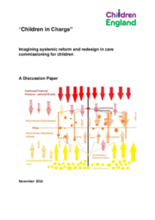This paper is an attempt at rethinking the systemic problems facing the funding and commissioning of care services and placements for children in need of care and adoption, across ALL types and specialisms of placement, from kinship care, through foster care, to residential care and adoption.
The ideas in this paper have been developed by Kathy Evans, CEO of Children England, based on findings and discussions over several years of involvement in examining the residential care market in particular, from both provider and commissioner perspectives. It has been shared with various stakeholders and submitted to Sir Martin Narey and the DfE as part of the Independent Review of Residential Child Care, but has not until now been more widely published. The genesis of this paper might have been firmly rooted in the residential care sector but it is vital to emphasise that the ideas explored here rely on a taking a unified approach to all children and their varied journeys through being in care and ending the ‘siloed’ approach of separate markets and funding streams for different segments and specialisms of care provision.
The central idea in this paper is to create a national ‘Care Bank’ to fund the costs of all placements (kinship, foster, residential and adoption) directly from the nation’s income taxes. It could free social workers to make care placement decisions led by children’s best interests rather than the need to ration council budgets; it would free councils to devote their locally-raised resources to community services that can help strengthen families and keep children happy and safe at home wherever possible. It would give children themselves a greater degree of say over where they want to live while in care and create a systemic focus on reducing the human and financial damage of multiple placement breakdowns.
While it has been developed and informed in dialogue with colleagues across the children’s sector, this idea does not represent a firm recommendation or public policy position from Children England or its membership; it is not a comprehensive research paper or a costed policy proposal. The analysis and ideas here are offered first and foremost to engage with all those already familiar with, operating within, and deeply troubled by, the children’s services ‘marketplace’.
It is intended to stimulate discussions and imaginations of what systemic reform could look like and to enable us think together about how relationships, power, money and decision-making in care commissioning could be organised very differently from the way they are now.
The most recent National Audit Office report on children in need of help and protection (Oct 2016) issued a stark warning that their analyses suggested there is ‘…systemic, not just local failure’. This paper is an attempt to imagine what a systemic response to systemic failure might look like. Children England will, of course, be very glad to hear 3 other ideas, to present and explore and evolve our thinking collaboratively, with any interested audiences and colleagues, or listen carefully to any critiques of what is written here.

